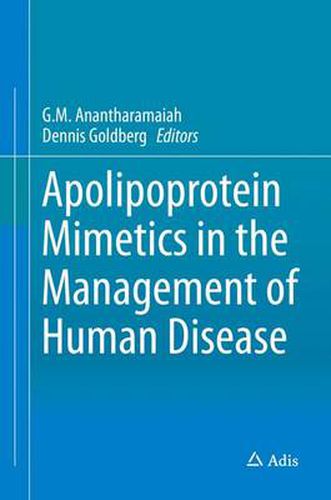Readings Newsletter
Become a Readings Member to make your shopping experience even easier.
Sign in or sign up for free!
You’re not far away from qualifying for FREE standard shipping within Australia
You’ve qualified for FREE standard shipping within Australia
The cart is loading…






This title is printed to order. This book may have been self-published. If so, we cannot guarantee the quality of the content. In the main most books will have gone through the editing process however some may not. We therefore suggest that you be aware of this before ordering this book. If in doubt check either the author or publisher’s details as we are unable to accept any returns unless they are faulty. Please contact us if you have any questions.
This comprehensive book provides not only the stages in the development of this unique and specialized field but also updates on the current state of research and development of apolipoprotein mimetics as therapeutic modalities for various lipid-mediated disorders. The book consists of 11 chapters all written by leading scientists from well-reputed laboratories in the USA. After an introduction by Dr. Godfrey Getz, Professor of Medicine at the University of Chicago and the Associate Editor of the Journal Lipid Research, the book presents a narration of how a theory can lead to the discovery of treatment modalities to several devastating diseases such as diabetes, Alzheimer’s disease, arthritis; asthma; atherosclerosis, chronic rejection of transplanted hearts and cancer.
Present therapies for most of these diseases are not adequate. Using the models of two long anti-atherogenic and anti-inflammatory proteins (apolipoprotein A-I and apolipoprotein E with 243 and 299 amino acids, respectively) short mimetic peptides of 18 to 28 amino acid residues in length, which can be produced either synthetically or genetically in edible fruits and vegetables, have been shown to exert profound biological effects in a large number of animal models of diseases.
The book also presents novel ideas, highly unexpected mechanisms of action in animal models and even in initial clinical studies in humans, which can lead to additional improvements in basic and clinical research in biological science. All the chapters are written by experts in their respective fields who have contributed immensely to the literature. This is the first compendium of this growing field presented in the form of a book.
$9.00 standard shipping within Australia
FREE standard shipping within Australia for orders over $100.00
Express & International shipping calculated at checkout
This title is printed to order. This book may have been self-published. If so, we cannot guarantee the quality of the content. In the main most books will have gone through the editing process however some may not. We therefore suggest that you be aware of this before ordering this book. If in doubt check either the author or publisher’s details as we are unable to accept any returns unless they are faulty. Please contact us if you have any questions.
This comprehensive book provides not only the stages in the development of this unique and specialized field but also updates on the current state of research and development of apolipoprotein mimetics as therapeutic modalities for various lipid-mediated disorders. The book consists of 11 chapters all written by leading scientists from well-reputed laboratories in the USA. After an introduction by Dr. Godfrey Getz, Professor of Medicine at the University of Chicago and the Associate Editor of the Journal Lipid Research, the book presents a narration of how a theory can lead to the discovery of treatment modalities to several devastating diseases such as diabetes, Alzheimer’s disease, arthritis; asthma; atherosclerosis, chronic rejection of transplanted hearts and cancer.
Present therapies for most of these diseases are not adequate. Using the models of two long anti-atherogenic and anti-inflammatory proteins (apolipoprotein A-I and apolipoprotein E with 243 and 299 amino acids, respectively) short mimetic peptides of 18 to 28 amino acid residues in length, which can be produced either synthetically or genetically in edible fruits and vegetables, have been shown to exert profound biological effects in a large number of animal models of diseases.
The book also presents novel ideas, highly unexpected mechanisms of action in animal models and even in initial clinical studies in humans, which can lead to additional improvements in basic and clinical research in biological science. All the chapters are written by experts in their respective fields who have contributed immensely to the literature. This is the first compendium of this growing field presented in the form of a book.